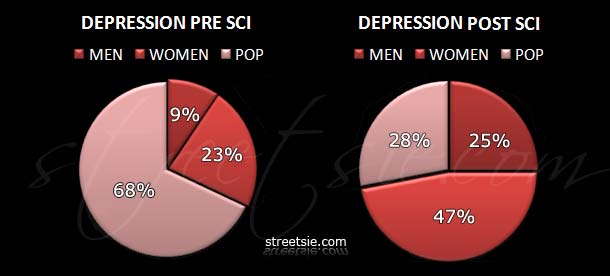Spinal Cord Injury Depression
There was no text message warning ahead of time the impending changes in your life. No phone call telling of what was around the corner. In one unpredictable moment, one split second in the span of a lifetime, your routine suddenly spins out of control. The days, weeks, and months following spinal cord injury turn into a blur of bad news, doctors, therapists and pain meds with strangers tossing, turning, and probing for answers. Few are prepared for such traumatic events that disrupt our lives causing great stress and deep depression.
In any traumatic event which causes such physical and emotional distress we often feel that our safety and sense of security has been compromised, invaded. Regardless of what caused the trauma, the fact remains we are thrown into a world of hurt, overwhelmed and struggling to cope with growing feelings of anxiety and stress. The weight of a whole new world is now on your shoulders.

Coping Mechanisims
Having endured acute physical trauma or serious illness some report they “did not have time to even think about what was happening” to them. Often during traumatic events, we feel numb and helpless, as if we’ve lost control of our lives. Others report experiencing the sensation of being outside themselves.
These coping mechanisms isolate us from the event. By distancing our self from the trauma we can better make choices in our own best interest. Much as if your best friend was sitting on your shoulder.
The impact of a traumatic event does not end when people have mended physically. It is also important to note the passage of time does not always heal the feelings caused by trauma. In fact, often the longer one goes without getting help the more intense the feelings of distress become.
In addition, each time we replay a traumatic event in our mind, that sense of dread, hopelessness, and vulnerability increases. Each time the traumatic event is replayed we may find ourselves portraying a different outcome, or better explanation for what happened. Thoughts of “if only” combined with the lack of a better outcome in reality can increase the feelings of depression.
Clinical Depression After Spinal Cord Injury
Most find ourselves feeling blue from time to time. Sometimes, these “blues” can turn into clinical depression. Depression can develop without warning or result from trauma, either emotional or physical trauma. The occurrence of major depression over the span of a lifetime in “western, industrialized nations” is approximately 7 to 12 percent in men and 20 to 25 percent in women. In individuals with spinal cord injury, the diagnosis of depression increases to 25 percent in men and 47 percent in women. These statistics show after a spinal cord injury the incidence rate of depression in both men and women more than doubles.

For a number of years, the medical community considered the experience of depression after a spinal cord injury as a “valued” and necessary component to “adjustment” to the injury. However more recently, substantive research has enlightened these attitudes, it is clear that the experience of one or more depressive episodes has no impact on the “successful adjustment to the injury.” Nor does any spinal cord injury automatically trigger episodes of severe depression.
Generally a clinical diagnosis of Post Traumatic Stress Disorder (PTSD) is only considered when the symptoms of acute depression have persisted for a duration of six months or more.
Common Symptoms of Depression
People experiencing depression can exhibit a broad spectrum of physical and emotional symptoms. The following is a list of the most commonly reported symptoms:
- Angry at medical staff, family members, and friends for “forcing” him/her to engage in treatment
- Avoidance of talking about cause of paralysis on anything more than a superficial level
- Avoidance of talking about the new reality of wheelchair life
- Changes in appetite: either a loss of appetite or increasing episodes of overeating
- Deliberately provoking interpersonal conflicts in order to push family and friends away
- Difficulty concentrating or remembering details, difficulty making decisions
- Feeling tired all the time, feeling as if you have no energy
- Feeling that life is not worth living since the loss of mobility
- Feeling irritable or restless
- Feeling helpless and worthless
- Feelings of guilt about surviving the accident (or other cause) which left him/her in a wheelchair
- Loss of emotional expression
- Loss of interest in activities or hobbies which were once enjoyable
- Ongoing feelings of sadness and emptiness
- Ongoing aches and pains, headaches, cramps or digestive problems that do not go away
- Physical symptoms that are not responding to treatment
- Problems with sleep: sleeping too much, unable to fall asleep, or unable to stay asleep
- Recurring thoughts of death or suicide
- Relationship avoidance: reluctant to form new friendships
A common medical disorder caused by an imbalance of chemicals in the brain, depression is more than occasional profound sadness and more than a serious case of “the blues”. Currently, research scientists cannot identify nor attribute any one singular recipe to the cause of depression. Fortunately however depression is treatable. A combination of antidepressant medication and therapy generally relieves the symptoms and provides ongoing recovery.
Thoughts of Suicide
- Do you believe that others would be better off if you were dead
- Do you have a history of suicide attempts
- Do you have frequent suicidal thoughts and a specific plan to follow
- Do you have frequent suicidal thoughts but are without any specific plans
- Do you have profound feelings of helplessness, hopelessness, and worthlessness
- Do you have recurring thoughts of death or wishes for death
One important thing for all of us to remember is that depression is not caused by personal weakness or a lack of will power. Nobody is at fault for depression. If you are experiencing one or more of the feelings listed above, please consult your doctor or phone your local crisis help line.
Kind Regards
Deb
hi Deb, having recently been involved in a road traffic accident and suffering an SCI, it was amazing to read your article. Actually if I was firing on all cylinders I could have written that myself because it’s what I am going through and also what I have been through in the past two months.
As a senior manager, my organised, planned and purposeful life was thrown into free fall – what made it worse was it was a drunk driver that hit me at 35 mph as I waited at a red light. I remember thinking at the time that this was the end, it wasn’t, but I have thought that a lot since…
Specialists, doctors, nurses, physiotherapists – it became a blur of faces and words and even now it seems like that.
So reading your article has helped me to feel less mad, less alone and less useless.
I guess all I needed to say was thank you, but I mean more than that, hope you understand!
Andrew
Hi Deb,
Actually my injury was a simple lifting of a heavy object. The object began to slip. As I tried grasping the object from falling and breaking, my life was changed forever.
My 12 year anniversary of my injury is approaching. I only need one hand to count the number of okay night’s of sleep I’ve had since my injury.
I feel as though the person I was, died the day of my injury. Although I never had a lot of close friends, I “never knew a stranger” as the saying goes.
I would stand in a store line and just gab w any & everyone. I can no longer stand in lines. I can walk some. I can stand some. But it’s very challenging.
I have gained over 50 lbs, simply due to my injury. I no longer eat any sort of well balanced meal. As it has become too uncomfortable to stand at a stove.
I lost all quality of life in a split second. Immediately following my accident, I became a first time grandmother. I’ve had three more grandchildren since.
The grandkids in the beginning, were all I cared to live for. But, as my injury along with depression has matured (has grown worse), the kids don’t seem to be enough to want to make me hang around on this earth.
The little ones are my only reason for not ending it all, but as the grow, I feel they really don’t need me. That I have no one which understands my daily life of Hell.
Of course I wouldn’t want my loved ones to feel my pain. I don’t even really know what I’m saying. I feel I’m just rambling. And that nothing I say, makes a bit of sense.
Thanks for allowing me to vent-
Sincerely, Donna